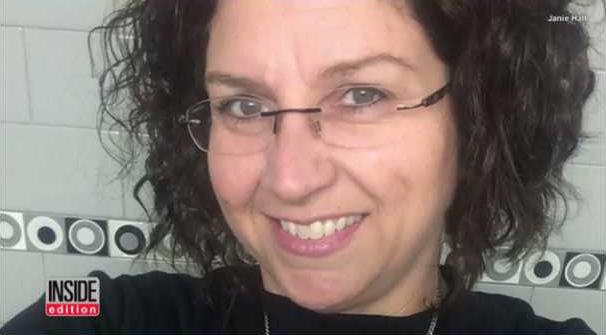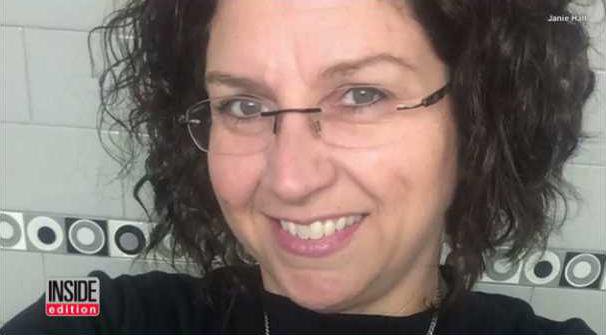Everyone loves to share their worst date stories or their best date stories, but 45-year-old Janie Hall will be sharing her scariest date story for the rest of her life.
She met her date at Cheesecake Factory on a Friday afternoon in April 2017. Hall and her date, who was in his 50s, met online. She had traveled just over two hours from her home in Joplin to Kansas City, Mo., to meet him.
The long travel time seemed worth it, as Hall said their first date was going well. So well, in fact, that they stayed 45 minutes after their empty plates had been cleared as they happily chatted about their kids, grandkids and perspectives on life.
We were having a great conversation, Hall said.
All of a sudden, her date started coughing and stood up to excuse himself. But he didnt get very far.
He collapsed face-first onto the floor
Hall was frightened as she saw her date plummet face-first on the floor, but as a former respiratory therapist, she kicked into healthcare mode.
A waitress at the restaurant, Rebecca Bartholomew, ran over to help. His eyes were glazed over and didn't have a pulse.
It was like a light switch, Hall said. One minute he was talking about family, and then hes dead. His body was as stiff as can be.
The former respiratory therapist and CPR-certified waitress immediately began administering CPR (cardiopulmonary resuscitation) as others called an ambulance.
After about four minutes, a faint pulse returned and he gasped for air as the paramedics arrived. The man, whose identity remains private, was taken to the hospital to recover.
Hall believes the whole experience was fate
Hall describes this life-saving experience as fate, saying she and Bartholomew were both in the right place at the right time.
Becca was not supposed to be serving that day but ended up taking that shift, general manager Jackie Cockrill said. She was meant to be there that day.
Hall is thankful for Bartholomews quick action on that tragic, yet miraculous event.
Becca embodies class, appreciation, and consideration for others, she shared on Facebook.
The man asked Hall for a second date
Hall visited her date in the hospital after the incident where he asked her out again. She happily accepted and they plan to go on a group date with his two daughters and Bartholomew.
As he recovers, Bartholomew and Hall set up a GoFundMe page to raise funds for his medical costs.
Hall hopes her story will encourage people to become CPR certified
My hope is that maybe somebody will hear this story and become CPR-certified, Hall said. "I'm proof that you never know when you may need to know it.
Knowing a few basics could help the 46 percent of people who experience cardiac arrest outside of a hospital and do not receive the immediate care they need.
The Mayo Clinic has tips on administering CPR. There are CPR courses provided by the American Heart Association, the American Red Cross or online from the National CPR Foundation.
If you arent trained in CPR, giving chest compressions to the tune Stayin Alive to maintain a rate of 100 to 120 chest compressions per minute can make a difference until professional help arrives.
She met her date at Cheesecake Factory on a Friday afternoon in April 2017. Hall and her date, who was in his 50s, met online. She had traveled just over two hours from her home in Joplin to Kansas City, Mo., to meet him.
The long travel time seemed worth it, as Hall said their first date was going well. So well, in fact, that they stayed 45 minutes after their empty plates had been cleared as they happily chatted about their kids, grandkids and perspectives on life.
We were having a great conversation, Hall said.
All of a sudden, her date started coughing and stood up to excuse himself. But he didnt get very far.
He collapsed face-first onto the floor
Hall was frightened as she saw her date plummet face-first on the floor, but as a former respiratory therapist, she kicked into healthcare mode.
A waitress at the restaurant, Rebecca Bartholomew, ran over to help. His eyes were glazed over and didn't have a pulse.
It was like a light switch, Hall said. One minute he was talking about family, and then hes dead. His body was as stiff as can be.
The former respiratory therapist and CPR-certified waitress immediately began administering CPR (cardiopulmonary resuscitation) as others called an ambulance.
After about four minutes, a faint pulse returned and he gasped for air as the paramedics arrived. The man, whose identity remains private, was taken to the hospital to recover.
Hall believes the whole experience was fate
Hall describes this life-saving experience as fate, saying she and Bartholomew were both in the right place at the right time.
Becca was not supposed to be serving that day but ended up taking that shift, general manager Jackie Cockrill said. She was meant to be there that day.
Hall is thankful for Bartholomews quick action on that tragic, yet miraculous event.
Becca embodies class, appreciation, and consideration for others, she shared on Facebook.
The man asked Hall for a second date
Hall visited her date in the hospital after the incident where he asked her out again. She happily accepted and they plan to go on a group date with his two daughters and Bartholomew.
As he recovers, Bartholomew and Hall set up a GoFundMe page to raise funds for his medical costs.
Hall hopes her story will encourage people to become CPR certified
My hope is that maybe somebody will hear this story and become CPR-certified, Hall said. "I'm proof that you never know when you may need to know it.
Knowing a few basics could help the 46 percent of people who experience cardiac arrest outside of a hospital and do not receive the immediate care they need.
The Mayo Clinic has tips on administering CPR. There are CPR courses provided by the American Heart Association, the American Red Cross or online from the National CPR Foundation.
If you arent trained in CPR, giving chest compressions to the tune Stayin Alive to maintain a rate of 100 to 120 chest compressions per minute can make a difference until professional help arrives.








